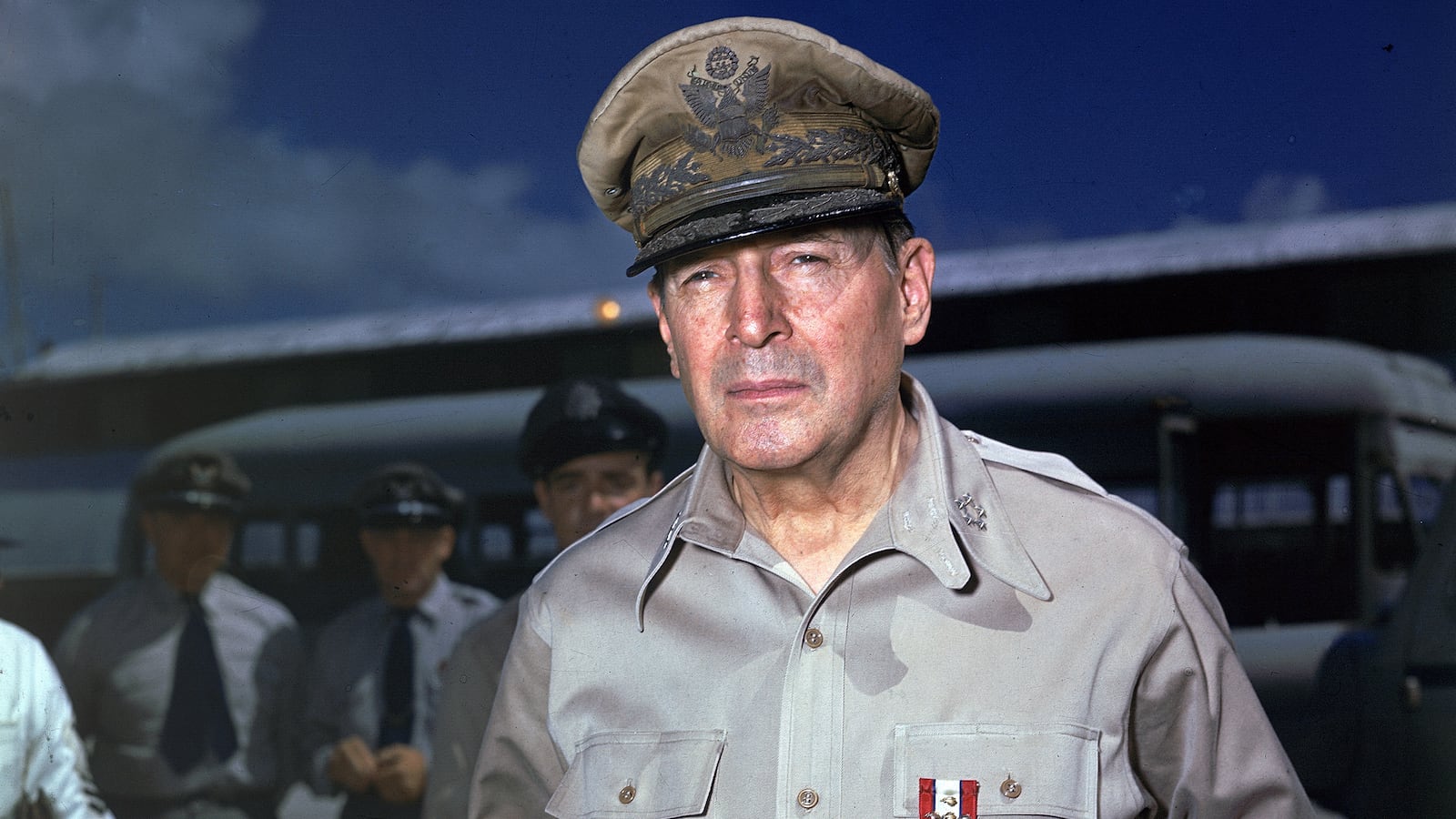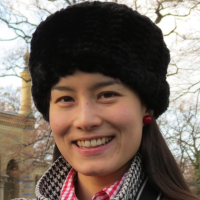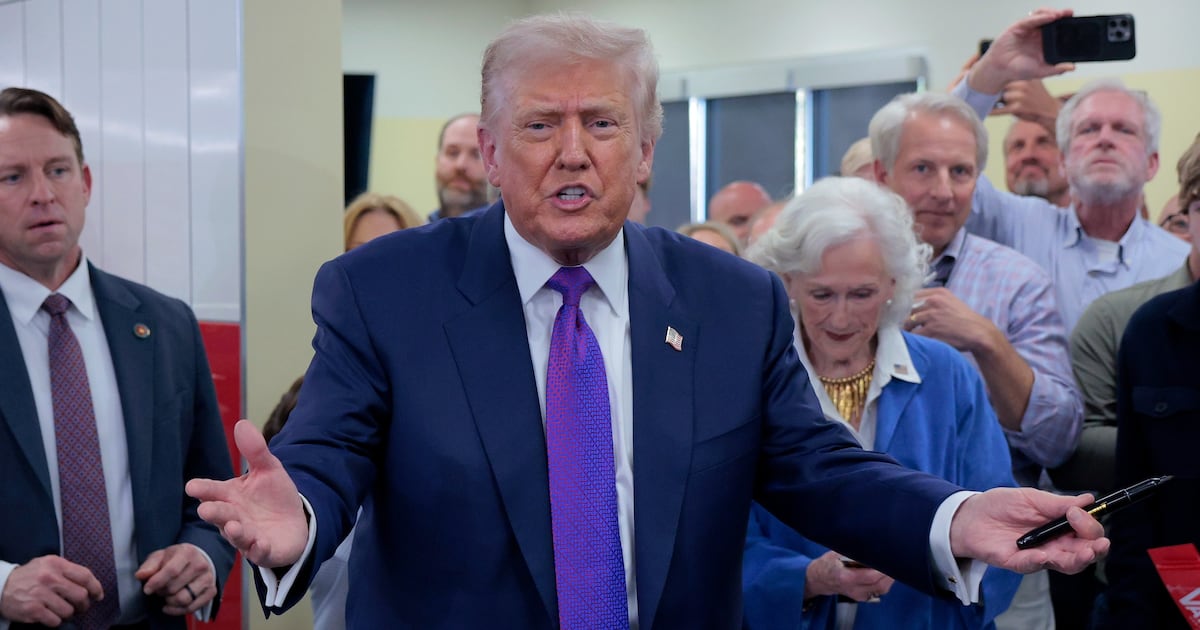TOKYO — To mark the 70th anniversary of the end of World War II, Dai-ichi Life Insurance Co. briefly opened to the public last month the room from which Gen. Douglas MacArthur ran occupied Japan. Nearly 4,000 people, who applied in advance, made the visit. So did we.
It was here in these so-called MacArthur Rooms that the five-star general and his team of Japanese staffers created the foundations of Japan’s democracy—and its pacifist constitution. So it’s interesting to reflect on those accomplishments at a time of growing concerns that Prime Minister Shinzo Abe’s administration is trying to turn Japan back into a military power by modifying that constitution.
On September 2, 1945, Supreme Allied Commander Douglas MacArthur presided over Japan’s official surrender on the USS Missouri warship in Tokyo Bay, subjecting Emperor Hirohito and the Japanese government to his authority. A week later, the West Point grad placed the General Headquarters in the Dai-ichi Life Head Office, which still stands in Chiyoda ward, facing the Imperial Palace. His mission was to rebuild Japan’s politics, economy, religion, and culture. Part of that work was to create a new constitution. The Japanese government submitted a constitution draft in early 1946, which GHQ found unacceptable. Using it as a springboard, they drafted a constitution that was primarily the work of MacArthur and his staff. The new constitution was de facto endorsed in popular elections in April 1946—in which Japanese women were also allowed to vote for the first time.
The final draft of the constitution, which went into effect on May 3, 1947, stripped Hirohito of all powers except for those as a symbol of state, established a bill of rights and equal rights for women, abolished the aristocracy, and made Japan a pacifist nation: “Aspiring sincerely to an international peace based on justice and order,” it declared, “the Japanese people forever renounce war as a sovereign right of the nation and the threat or use of force as means of settling international disputes.”
MacArthur’s desk, which is more like a table, is remarkably sober. It has no drawers. “He was a living computer, processing data from all over the world and making correct choices,” is how one staffer remembers him.
We were not able to visit all the rooms that once housed GHQ. We did however get to talk with one man who has been in all them: George Kizaki, now 86 years old, is one of the last living interpreters who worked for MacArthur—and one who still recalls the ferocity of his old boss decades later.
***
George Kizaki is a second-generation Japanese who was born in California. He is still a dapper dresser, prone to three-piece suits, neckties, and porkpie hats. Kizaki says when he visited Japan when he was 14 or 15, that as an outsider, he wasn’t made to feel welcome; the anti-American mood was strong. People thought he was a spy. He felt like his family was racing to escape being captured when they rushed to catch the boat home. Of course, he wasn’t much welcome back home, either. During the war, his family was put in an internment camp and their assets frozen. Kizaki notes, “The U.S. didn’t intern the Italians or the Germans. Just us. Everywhere we went, we were called Japs. People threw rocks at us. We couldn’t use public restrooms. ‘No Japs Allowed.’”
After the war ended, Kizaki’s family left the internment camp, but in 1946, at the age of 19, he was drafted as a civilian employee—an interpreter—and put in the legendary 442nd Infantry regiment, one of toughest fighting units, compromised almost entirely of Japanese Americans. He is very proud to have been part of that unit, although he never saw combat. “They fought for America’s freedom against their own ancestors, and fought valiantly, while back home their families were imprisoned. They endured insults and racial slurs. They were the toughest.”
After a brief stint with the 442nd, he was reassigned to the Civil Intelligence Section (G2) of GHQ. Kizaki’s first impression of Japan as he landed at Yokohama Harbor was that the country was extremely poor—his first meal after the long trip was a bowl of miso soup and a bunch of takuan (pickled radish). His job required him to always move around by car with high-ranking officers from the U.S. Army. He said he also sometimes felt sympathy for the Japanese people he met through his job.
“When I walked in the streets with the American officers, Japanese people often came to us and asked for food,” he recalls. “The other day, I had bacon and eggs in Ginza and tears started to flow in my eyes, because I remembered that when I was young, I had to cross the ocean and return to the distant America in order to eat that same meal. When I closed my eyes and tried to remember my home, it’s California I saw.”
Kizaki didn’t scare easily but he was scared of MacArthur, who was often screaming and yelling everywhere in the office. He was appointed to work directly under the general in 1949 but recalls meeting him earlier.
“The first time I met him [Douglas MacArthur], he said, ‘What are you doing here? Get out of here! Get out of here!’ in English,” Kizaki remembers. “It was always ‘yes’ or ‘no’ with him. He was not patient with wishy-washy words. He was a Spartan man. Even MacArthur’s office furniture had no taste, it really looked like a prison.”
Yet, Kizaki grew to respect his boss. “He was criticized for saying the Japanese were ‘a nation of 12 year olds.’ But he was expressing that Japan worships the victor; that ‘the winner is the good guy and the loser is the bad guy’ mentality. MacArthur was like a new emperor; he was welcomed. And he was a ruler that wanted to make Japan better. He worked tirelessly to improve the lives of the Japanese people. Almost never taking a day off.”
He will tell you that MacArthur was not a racist, that he was a fair but stern individual. He will tell you MacArthur was a puritan, a stern master, and a master of public relations. “That corn-cob pipe, that was just for show, to show he was a tough and rough guy. He had a fancy one he smoked in his office,” he says with a twinkle in his eye.
Kizaki stayed in the military for 10 years—primarily in military intelligence—and most of his work was something he refuses to discuss. He occasionally drops hints. When we mentioned the name of Yoshio Kodama, the war profiteer, CIA spy, and yakuza associate who helped created Japan’s ruling Liberal Democratic Party, his eyes light up: “Kodama-Sensei! Oh, yes, he was an impressive man. Met him a few times.” Press him for context, and he just smiles. Mention Beate Sirota Gordon, the American woman who gave Japanese women equal rights in Japan’s constitution and he remembers her.
Kisaki, when pressed for details of certain events, falters, and states clearly, “I signed an oath never to divulge what I learned during that time.” He was present at one of the few rare meetings MacArthur had with the emperor, but will not discuss what was said. He noted that MacArthur had respect for the man but Kizaki said interpreting for the emperor was a nightmare.
“The emperor spoke a whole different other kind of Japanese—a royal dialect, something that only the Imperial Family and the court really used. I had to study up on it to understand what he was saying. It was like learning a second language.”
When asked about the current debate over Japan’s pacifist constitution, Kizaki refuses to weigh in. Although both left and right in Japan are interested in what he has to say, hoping to make him a mouthpiece for their political views, he seems to have a healthy aversion to politics. The only concession he would make on the issue after hours of interviews was this, “Well, Japan’s done pretty good with its peace constitution, ya know…”
He does not elaborate.
Did he like MacArthur?
“Like… I respected him and admired him. I think Japan should be a little more grateful for all he did. He was a great man.”
***
When we went to visit the room in Dai-ichi Life where the constitution was drafted, it was locked and sealed. No one answered the door. This historical place has been turned into a conference room. There is some irony in that the pacifist constitution—created in the offices of a life insurance company—was meant to ensure that Japan never went to war again, and that no more lives were lost in pointless wars.
The Abe administration seems ready to revoke that “insurance policy”—even though more than 95 percent of Japan’s scholars say the pending legislation is unconstitutional, the majority of the public opposes it, and massive protests continue each week as the bills are debated. What would MacArthur say about it if he were alive today?
Unfortunately he is not, but perhaps he does have the final word. In the display case of the MacArthur memorial room, there is a framed signed photo of the general addressed to all the staffers (including the Japanese) at GHQ from 1948. It is his acknowledgement that they all played a role in the creation of the modern nation:
To the government section
With my admiration and affectionate regard “No group has worked more assiduously, more efficiently, or more successfully in the building of a new and democratic Japan.”
Douglas MacArthurSeptember 2nd, 1948Tokyo







